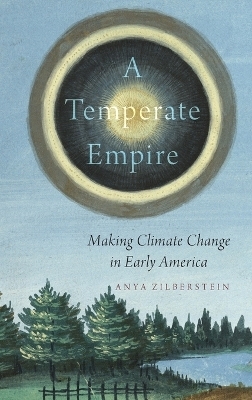
A Temperate Empire
Making Climate Change in Early America
Seiten
2016
Oxford University Press Inc (Verlag)
978-0-19-020659-8 (ISBN)
Oxford University Press Inc (Verlag)
978-0-19-020659-8 (ISBN)
A Temperate Empire explores how early North American settlers understood the widespread process of climate warming and tried to remake local climates through colonial settlement and economic development.
Most people assume that climate change is recent news. A Temperate Empire shows that we have been debating the science and politics of climate change for a long time, since before the age of industrialization.
Focusing on attempts to transform New England and Nova Scotia's environment in the seventeenth and eighteenth centuries, this book explores the ways that early Americans studied and tried to remake local climates according to their plans for colonial settlement and economic development. For colonial officials, landowners, naturalists and other local elites, New England and Nova Scotia's frigid, long winters and short, muggy summers were persistent sources of anxiety. They became intensely interested in understanding the natural history of the climate and, ultimately, in reducing their vulnerability to it. In the short term, European migrants from other northern countries would welcome the cold or, as one Loyalist from New Hampshire argued, the cold would moderate the supposedly fiery temperaments of Jamaicans deported to colonial Nova Scotia. Over the long term, however, the expansion of colonial farms was increasingly tempering the climate itself. A naturalist in Vermont agreed with Benjamin Franklin and Thomas Jefferson when he insisted that every cultivated part of America was already "more temperate, uniform, and equal" than before colonization--a forecast of permanent, global warming they all wholeheartedly welcomed.
By pointing to such ironies, A Temperate Empire emphasizes the necessarily historical nature of the climate and of our knowledge about it.
Most people assume that climate change is recent news. A Temperate Empire shows that we have been debating the science and politics of climate change for a long time, since before the age of industrialization.
Focusing on attempts to transform New England and Nova Scotia's environment in the seventeenth and eighteenth centuries, this book explores the ways that early Americans studied and tried to remake local climates according to their plans for colonial settlement and economic development. For colonial officials, landowners, naturalists and other local elites, New England and Nova Scotia's frigid, long winters and short, muggy summers were persistent sources of anxiety. They became intensely interested in understanding the natural history of the climate and, ultimately, in reducing their vulnerability to it. In the short term, European migrants from other northern countries would welcome the cold or, as one Loyalist from New Hampshire argued, the cold would moderate the supposedly fiery temperaments of Jamaicans deported to colonial Nova Scotia. Over the long term, however, the expansion of colonial farms was increasingly tempering the climate itself. A naturalist in Vermont agreed with Benjamin Franklin and Thomas Jefferson when he insisted that every cultivated part of America was already "more temperate, uniform, and equal" than before colonization--a forecast of permanent, global warming they all wholeheartedly welcomed.
By pointing to such ironies, A Temperate Empire emphasizes the necessarily historical nature of the climate and of our knowledge about it.
Anya Zilberstein is Associate Professor of History at Concordia University in Montreal.
Acknowledgments
Introduction - Improving the Climate
Part I: Climate and Geography
Chapter 1 - The Golden Mean
Chapter 2 - Transatlantic Networks and the Geography of Climate Knowledge
Part II: Climate and Colonialism
Chapter 3 - An American Siberia
Chapter 4 - Jamaicans In and Out of Nova Scotia
Chapter 5 - A Work in Progress
Notes
Bibliography
Index
| Erscheinungsdatum | 17.11.2016 |
|---|---|
| Zusatzinfo | 7 illus. |
| Verlagsort | New York |
| Sprache | englisch |
| Maße | 241 x 157 mm |
| Gewicht | 544 g |
| Themenwelt | Geschichte ► Allgemeine Geschichte ► Neuzeit (bis 1918) |
| Geisteswissenschaften ► Geschichte ► Regional- / Ländergeschichte | |
| Geschichte ► Teilgebiete der Geschichte ► Wirtschaftsgeschichte | |
| Naturwissenschaften ► Biologie ► Ökologie / Naturschutz | |
| Naturwissenschaften ► Geowissenschaften ► Geografie / Kartografie | |
| Sozialwissenschaften ► Soziologie | |
| ISBN-10 | 0-19-020659-4 / 0190206594 |
| ISBN-13 | 978-0-19-020659-8 / 9780190206598 |
| Zustand | Neuware |
| Informationen gemäß Produktsicherheitsverordnung (GPSR) | |
| Haben Sie eine Frage zum Produkt? |
Mehr entdecken
aus dem Bereich
aus dem Bereich
Giordano Bruno - ein ketzerisches Leben
Buch | Hardcover (2024)
C.H.Beck (Verlag)
CHF 41,85
das dramatische 16. Jahrhundert
Buch | Hardcover (2024)
Rowohlt Berlin (Verlag)
CHF 47,60


